Resources
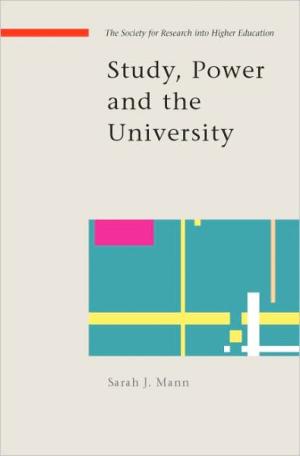
This book highlights the effects of power within the higher educational process, and argues that in order to understand the student experience we have to take seriously the institution as a context for learning. It considers key questions such as: • Why is the student experience of higher education sometimes negative or restricted? • How does power operate within the institution? • What are the forces that limit or enable student agency? • How can institutions of higher education create conditions which best support more enabling forces? Higher Education has its own particular culture, social relations and practices, governed by social and discursive norms. It is always implicated in relations of power through its function in society and its effects on individuals. This book considers how, for the student, these effects can be enabling and engaging, or limiting and diminishing. In exploring the effects of the institutionalization of learning and the workings of power implicated within this, it sets out to add to more cognitive and pedagogic ways of understanding student experience in higher education. Study, Power and the University provides key reading for educational researchers and developers, academics and higher education managers. Sarah J. Mann is Senior Lecturer in the Learning and Teaching Centre at the University of Glasgow. She is head of the Academic Development Unit and is responsible for the MEd in Academic Practice. (From the Publisher)
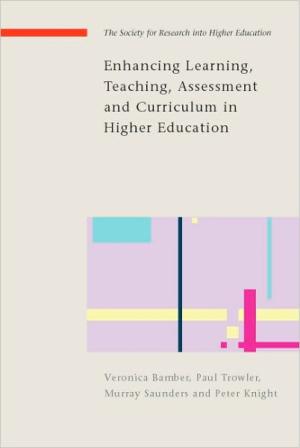
Higher education is a particularly complex site for enhancement initiatives. This book offers those involved in change a coherent conceptual overview of enhancement approaches, of the change context, and of the probable interactions between them. The book sets enhancement within a particular type of change dynamic which focuses on social practices. The aim is to base innovation and change on the probabilities of desired outcomes materializing, rather than on the romanticism of policies that underestimate the sheer difficulty of making a difference. Following a theoretical introduction to these ideas, there are case studies (from the UK, Australia, New Zealand, South Africa and Norway) at the national, institutional, departmental and individual levels, illustrating the argument that enhancement is best achieved when it works with social practices in real institutional and organizational settings. In a final section, the authors link the case examples and theoretical frameworks, inviting readers to consider their own enhancement situations and apply the 'frameworks for action' offered in earlier sections of the book. The book doesn’t offer quick-fix solutions but aims to support change with practical examples, conceptual tools and reflexive questions for those involved in change at all levels. It is key reading for higher education lecturers, managers, educational developers and policy makers. (From the Publisher)
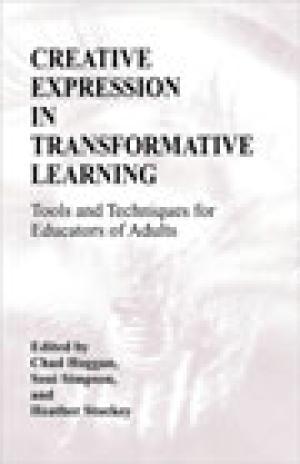
Transformative learning is a theory of adult education that focuses on the profound changes-or transformations-that can occur in the lives of adults. It is not as concerned with incremental advances in learners' knowledge as it is with their mental frameworks for making meaning from life experiences. This book explores the role of creative expression in this transformational process. It provides a practical and accessible approach to using creative expression with adult learners. The book provides various tools, methods and creative modalities that have been used to promote transformative learning, and discusses how adult educators themselves are transformative learners. (From the Publisher)
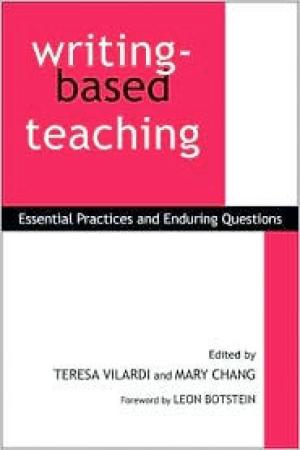
Written by the team at Bard College's Institute for Writing and Thinking, this book is designed to provide practical guidance regarding the challenges and potential of writing-based teaching, and suggestions for how to adapt the practices to particular classroom situations. The contributors share candid, first-hand accounts of what it is like to make writing central to teaching in secondary schools and colleges. As teachers of literature, composition, poetry, mathematics, anthropology, and education, they offer philosophical and theoretical reflections, practical guidance, and personal stories about how to help students become better, more-fluent writers, close readers, and reflective thinkers. This book will be of interest to writing center directors, for what it says about how to do collaborative learning and revision and seeing writing as a way to build community, and to writing teachers for how it demystifies freewriting, focused freewriting, and dialectical notebooks. Any individual, program, or institution seriously interested in understanding and practicing the writing process would benefit from using this text. One of the most important ideas in this collection is that we, as writing teachers, need to develop habits of action and habits of mind that students can take with them. (From the Publisher)
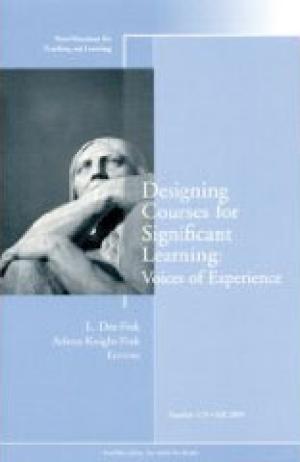
Higher education today is being called on to deliver a new and more powerful kind of education, one that prepares students to be more engaged citizens, better equipped to solve complex problems at work and better prepared to lead meaningful lives individually. To respond to this call, teachers in colleges and universities need to learn how to design more powerful kinds of learning into their courses. In 2003, Dee Fink published a seminal book, Creating Significant Learning Experiences, that offered teachers two major tools for meeting this need: the Taxonomy of Significant Learning and the model of Integrated Course Design. Since that time, educators around the world have found Finks ideas both visionary and inspiring. This issue of New Directions for Teaching and Learning contains multiple stories of how college-level teachers have used these ideas in a variety of teaching situations, with subject matter ranging from the sciences to the humanities. Their conclusion? The ideas in Finks book truly make a difference. When used properly, they lead to major improvements in the level of student engagement and the quality of student learning! This is the 119th volume of the Jossey-Bass higher education quarterly report series New Directions for Teaching and Learning, which offers a comprehensive range of ideas and techniques for improving college teaching based on the experience of seasoned instructors and the latest findings of educational and psychological researchers. (From the Publisher)
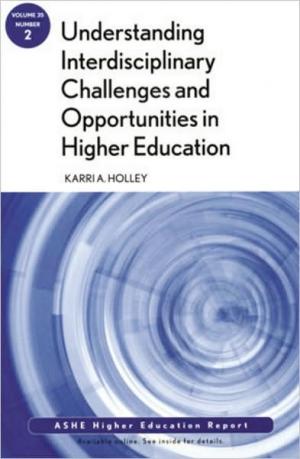
Interdisciplinary teaching, learning, and research are often heralded as necessary responses to the many pressures facing contemporary higher education. Defined as the integration of knowledge from two or more disciplines, interdisciplinary work requires a change in the boundaries and norms that have long defined the academy. Through examples from a range of disciplines and institutional types, this volume considers how successful interdisciplinary engagement necessitates a focus on the structure and rewards of academic behavior. This change is an intensely social process, involving dialogue and interation among diverse ideas, individuals, learning environments, and bodies of knowledge. It is this diversity that enables the rich potential of interdisciplinary engagement but also presents the greatest challenges for institutions. This volume considers the obstacles and opportunities inherent in interdisciplinary initiatives. Academic administrators, faculty, and graduate students interested in understanding the disciplinary norms of higher education and cultivating interdisciplinary engagement will benefit from this volume. The author provides theoretical perspectives and practical applications for advancing interdisciplinarity in the classroom, the research laboratory, across the university campus, and outside institutional boundaries. Such endeavors entail not only interaction between scholars and professionals from normally distinct disciplines but also articulation of shared problems or topics that underscore the integration of disciplinary bodies of knowledge. This is the second issue in the 35th volume of the Jossey-Bass series ASHE Higher Education Report. Each monograph in the series is the definitive analysis of a tough higher education problem, based on thorough research of pertinent literature and institutional experiences. Topics are identified by a national survey. Noted practitioners and scholars are then commissioned to write the reports, with experts providing critical reviews of each manuscript before publication. (From the Publisher)
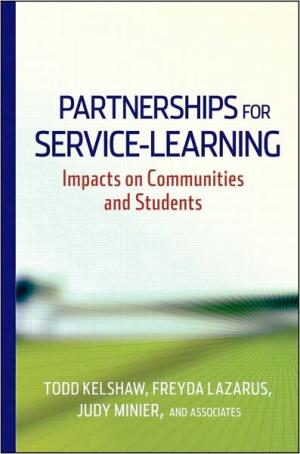
Praise for Partnerships for Service-Learning "These case studies highlight the critical importance of reciprocity in campus-community partnerships. It is through the two-way interchange of knowledge and assets that service-learning achieves its democratic potential as a pedagogy with the power to transform education, campuses, and communities. The examples provided here offer rich and sophisticated models that will be invaluable for community as well as academic leaders committed to deepening the partnering process." — John Saltmarsh, professor of higher education administration and director, New England Resource Center for Higher Education, University of Massachusetts, Boston; and Edward Zlotkowski, professor of English, Bentley University "This practical guide explores the power and pedagogy of K–12 school and university partnerships. This educational 'how-to' is a superior resource and must-read for every school and community leader across the country." — Arlene C. Ackerman, superintendent of schools, Philadelphia School District "This is a rare book about partnerships. It provides testimony to the diversity of real-world problems that can be addressed though service-learning partnerships between K–12 and higher education. Required reading for future teachers, educators, and community leaders interested in building campus-community relationships that embrace collaboration and shared decision-making." — Ramon C. Cortines, superintendent of schools, Los Angeles Unified School District "This is a terrific set of diverse yet complementary case studies illustrating the great potential of P–16 educational partnerships benefitting allparticipants. This book helps explain why service-learning works so well for so many schools, universities, and community-based organizations." — Shelley H. Billig, vice president, RMC Research Corporation?? (From the Publisher)
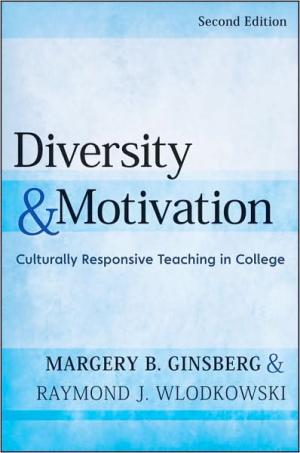
Praise for the Second Edition of Diversity and Motivation "Since the first publication of Diversity and Motivation in 1995, we have consistently used this text and its philosophy in our faculty development at Valencia Community College. I am delighted to see that this new edition focuses on college teaching. Ginsberg and Wlodkowski's approach to the diverse challenges of student motivation is authentic and transforming, and faculty respond!" —Ann E. Puyana, assistant vice president for academic affairs, Valencia Community College "There is a great need for deeper understanding and conceptualization of student motivation across diverse groups to change the consciousness of educators and, ultimately, society. For those of us who teach, and face that need daily, this work illuminates and inspires." —Ed Taylor, vice provost and dean, Undergraduate Academic Affairs, University of Washington? "No one knows more about creating intrinsically motivating classroom environments in diverse settings than Margery Ginsberg and Raymond Wlodkowski. Every educator who wants to engage students fully for success should read this book!" —Beverly Daniel Tatum, president, Spelman College (From the Publisher)
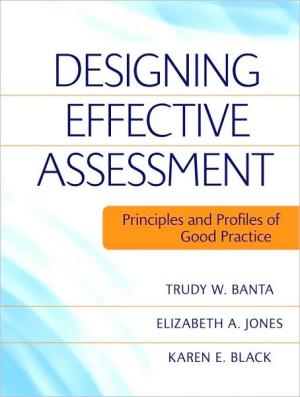
Fifteen years ago Trudy Banta and her colleagues surveyed the national landscape for the campus examples that were published in the classic work Assessment in Practice. Since then, significant advances have occurred, including the use of technology to organize and manage the assessment process and increased reliance on assessment findings to make key decisions aimed at enhancing student learning. Trudy Banta, Elizabeth Jones, and Karen Black offer 49 detailed current examples of good practice in planning, implementing, and sustaining assessment that are practical and ready to apply in new settings. This important resource can help educators put in place an effective process for determining what works and which improvements will have the most impact in improving curriculum, methods of instruction, and student services on college and university campuses. (From the Publisher)
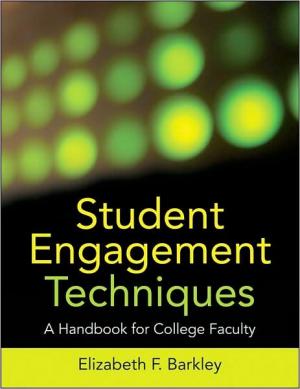
Keeping students involved, motivated, and actively learning is challenging educators across the country,yet good advice on how to accomplish this has not been readily available. Student Engagement Techniques is a comprehensive resource that offers college teachers a dynamic model for engaging students and includes over one hundred tips, strategies, and techniques that have been proven to help teachers from a wide variety of disciplines and institutions motivate and connect with their students. The ready-to-use format shows how to apply each of the book's techniques in the classroom and includes purpose, preparation, procedures, examples, online implementation, variations and extensions, observations and advice, and key resources. "Given the current and welcome surge of interest in improving student learning and success, this guide is a timely and important tool, sharply focused on practical strategies that can really matter." Kay McClenney, director, Center for Community College Student Engagement, Community College Leadership Program, the University of Texas at Austin "This book is a 'must' for every new faculty orientation program; it not only emphasizes the importance of concentrating on what students learn but provides clear steps to prepare and execute an engagement technique. Faculty looking for ideas to heighten student engagement in their courses will find usefultechniques that can be adopted, adapted, extended, or modified."Bob Smallwood, cocreator of CLASSE (Classroom Survey of Student Engagement) and assistant to the provost for assessment, Office of Institutional Effectiveness, University of Alabama "Elizabeth Barkley'sencyclopedia of active learning techniques (here called SETs) combines both a solid discussion of the research on learning that supports the concept of engagement and real-life examples of these approaches to teaching in action." James Rhem, executive editor, The National Teaching & Learning Forum (From the Publisher)